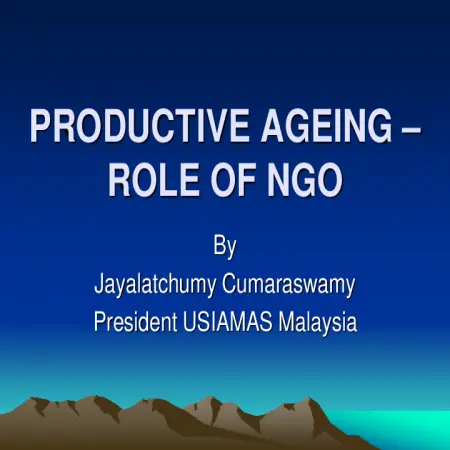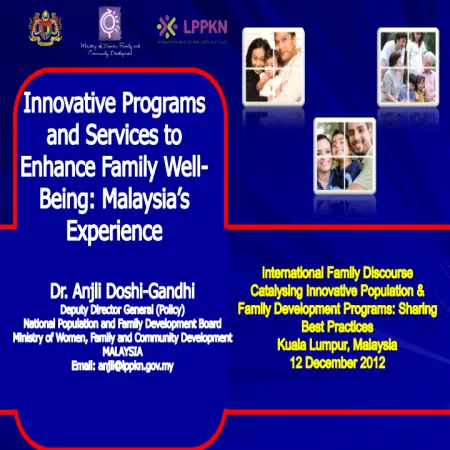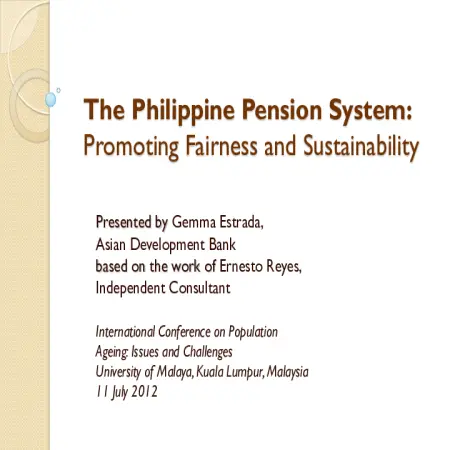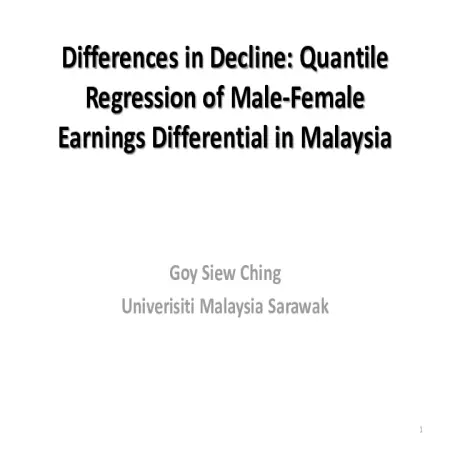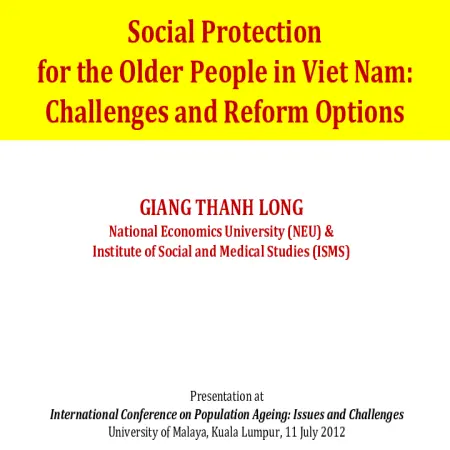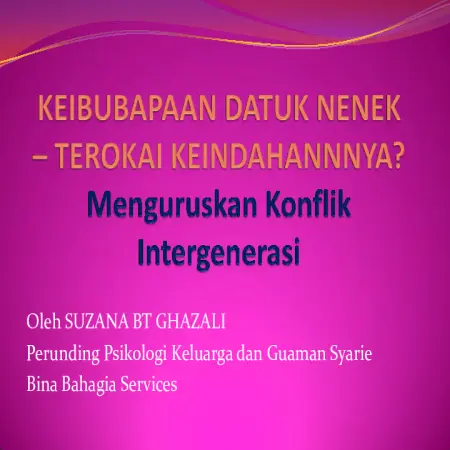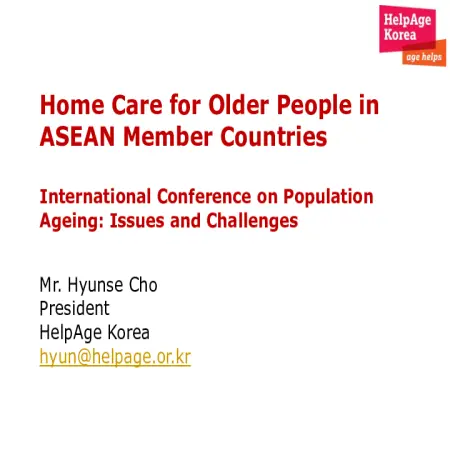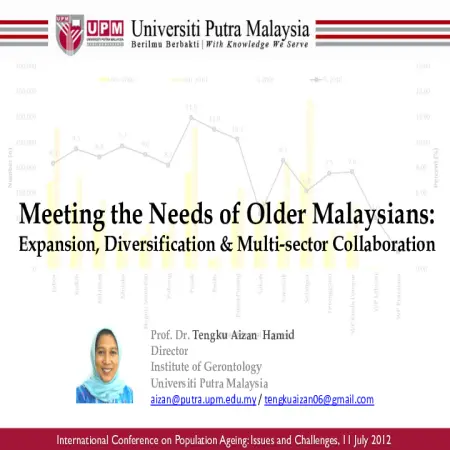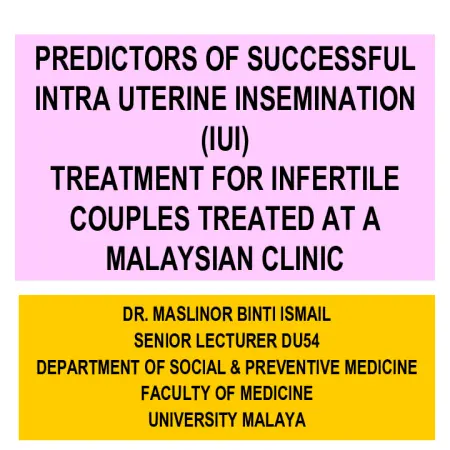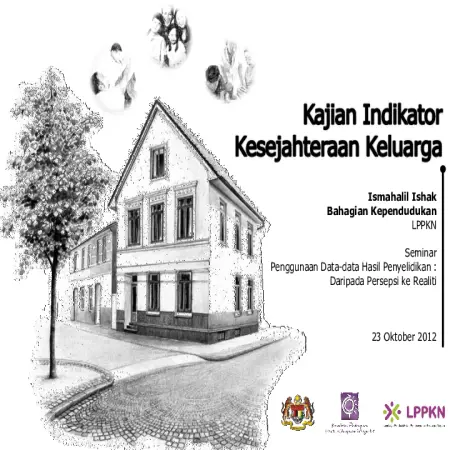TOPICS
|
|
Productive aging - role of NGO
Item Type: Conference or Workshop Item
Editor:
Year: 00/00/2012
Abstract: Butler and Gleason (1985) define productive ageing as “the capacity of an individual or a population to serve in the paid workforce, to serve in volunteer activities, to assist in the family and to maintain himself or herself as independent as possible.” USIAMAS is a non-governmental organization (NGO), registered in 2002 with the Registrar of Societies. It is a non-profit and welfare related organization whose members are senior citizens themselves. USIAMAS was formed with the objectives of being a smart partner or consultant to government, corporate and other volunteer bodies who share the same mission and vision of planning, implementing, coordinating, evaluating policies, projects and programs for the wellbeing of senior citizens towards quality and meaningful life. Among the various programs run by USIAMAS to support productive ageing are seminars, capacity training programs for volunteers and with the cooperation of the Social Welfare Department of Malaysia manages an Activity Center for Senior Citizens in Kompleks Penyayang Sungai Buloh. USIAMAS was honored to be chosen by HELPAGE Korea to implement a pilot project on home-help in 2005. Home-help is a community support program aimed at ‘recruiting, developing and deploying volunteers to make regular visits as informal companions and soft-skilled caregivers to older persons staying in their homes.’The normal duties of a volunteer in a home-help program include ‘personal grooming, running errands, feeding, reminders on medication, writing letters, accompanying them on recreational activities, visit to hospitals, banks or supermarkets’ More often the mere art of listening and responding to the needs of older persons will help to overcome their feelings of ‘rejection, isolation, boredom and loneliness’. The pilot project which commenced in 2005 has now been extended to Negeri Sembilan and Melaka with the support of the Social Welfare Department of Malaysia.
|
|
|
|
|
|
Innovative programs and services to enhance family well-being: Malaysia's experience
Item Type: Conference or Workshop Item
Editor:
Year: 00/00/2012
Abstract: Families constantly face new pressures and challenges due to rapid Industrialisation, modernisation and globalisation. Globalization in general brings benefits to families but it also creates risks and challenges that must be anticipated and adapted to. Hence, we have to be alert and responsive to future challenges that families will face and equip them with the necessary knowledge, skills as well as provide the needed services. As family is the most fundamental and important social unit, commitments at the highest level should be sought. Family well-being in Malaysia has been affected positively or negatively by development. Currently, Malaysian families face many challenges as a consequence of the changes in its structure, the increase in the proportion of nuclear families and changing lifestyles. Adaptations will have to be made so as not to lose the family support system, such as for child care, care of the elderly and the infirmed. Hence, the 3P Approach (Public, Private and People) which involves the partnership of multiple stakeholders such as the government, civil society and CSOs in ensuring that the present and future generation is more peaceful, secure, tolerant, prosperous and sustainable is most paramount in nation building. There are various innovative initiatives that have been undertaken in strengthening the family institution such as the National Family Policy, 1Malaysia Family First (1MF1st) and 1 Malaysia Youth and Empowerment Support (1MYes) under the National Blue Ocean Strategy, Strengthening of Marriage Institution (SmartStart Pre-Marriage Program), 1 Stop Family Centre, family education programmes such as KASIH Modules, Parenting@Work, Smart Belanja@Lppkn, Lppkn@Community and counselling programmes. Realizing that the happiness of the people and wellbeing of the family is an important goal in becoming a high income country by 2020, the government is developing its own model of the United Nations World Happiness Index. Currently, Malaysia is placed 51st among 156 countries. Meanwhile, a National Family Wellbeing Index developed by the Ministry Of Women, Family and Community Development through the National Population and Family Development Board in 2011 found that the Family Wellbeing Index is 7.55 out of 10. The Family Well-Being (FWB) Index consists of seven domains; Family Functioning, Economy, Health, Safety, Community, Religion and Spirituality, and Housing and Environment. The FWB Index indicates that Malaysian families have a relatively high level of wellbeing but more still needs to be done.
|
|
|
|
|
|
The Philippine pension system: promoting fairness and sustainability
Item Type: Conference or Workshop Item
Editor:
Year: 00/00/2012
Abstract: This paper presentation about sharing knowledge on the retirement system in the Phillippines, currently characterized by a four-pillar structure. The first pillar refers to social assistance programs created to address the needs of the elderly poor. The second pillar covers the following mandatory defined-benefit programs: (i) the Social Security System (SSS) for private sector workers, (ii) the Government Service Insurance System (GSIS) for public sector workers, and (iii) the Armed Forces of the Philippines Retirement Service Benefit System for the military, which altogether cover about 79% of the labor force. The third pillar encompasses mandatory defined contribution programs, which can be further expanded. The fourth and final pillar covers voluntary pension programs, involving various forms of savings instrument. Because the pension system is fragmented, contributions and benefits vary depending on the program.
|
|
|
|
|
|
Social protection for the older people in Vietnam: challenges and reform options
Item Type: Conference or Workshop Item
Editor:
Year: 00/00/2012
Abstract: This paper aims to argue that the Vietnamese population has been aging more quickly than expected, and as such policies toward an aging population, particularly delivery of social protection services for the aged, should be well-prepared from now in order to have older and wealthier population in the coming decades. The paper shows that the social protection schemes in Viet Nam, especially pensions and social allowances, have expanded and reached various groups of old-age persons and played an important role in reducing old-age poverty. Yet, there have remained a number of challenges that will substantially influence the current system in term of financial sustainability and generational equity. For the pension scheme, the paper argues that the current setting will not be financially stable and generational equity and as such it should be transformed toward a new setting. For the social allowances, a universal cash transfer program for older people would be influential and cost-saving in terms of poverty reduction.
|
|
|
|
|
|
Keibubapaan datuk nenek - terokai keindahannya? menguruskan konflik intergenerasi
Item Type: Conference or Workshop Item
Editor:
Year: 00/00/2012
Abstract: This topic discusses conflicts that occur involving intergeneration. Among the conflict that occur are in term of acceptance (as a non-son/daughter-in-law of choice), trust (ability to look after the child’s welfare) and confidence (do not wanting the heirs to be ‘damaged’). Some of the steps that can be taken to overcome this conflict are to understand the roles and responsibilities of each as well as perform the role with full responsibility and tolerance.
|
|
|
|
|
|
Home care for older people in ASEAN member countries
Item Type: Conference or Workshop Item
Editor:
Year: 00/00/2012
Abstract: It is estimated that population of over 60 years in the South-Asia will triple between 2000 and 2050. By 2050, one out of four older people will be over the age of 80. This causes a growing need for welfare and health services for older people. However, the traditional family support system is under pressure due to the trend towards nuclear families, prevailing migration of children and increasing participation of women in the workforce. In most developing countries, the lack of appropriate programmes, policies and financing places further strain on an already stressed family system. In order to meet the growing needs of “CARE” services for older people in the community, HelpAge Korea have implemented HOME CARE project under the ROK-ASEAN Cooperation Project, which provides basic social and health related care services for older people who are poor and having difficulties of ADL at their home by volunteers. The HOME CARE project has been implemented in collaboration with government, non-government organizations and community people in 10 ASEAN member countries for 9 years from April 2003 to May 2012. The presentation shares the outcomes of HOME CARE project that has been successfully conducted in terms of developing localized model, strengthening GO & NGO collaboration for the expansion and influencing GO to integrate HOME CARE into policy framework. HOME CARE is one of community based care system to reduce the burden of the society and to improve the quality of life of older people. However, in responding to the need of vulnerable older people, there is no single solution but a series of care system is necessary. The presentation shares the future plan of ROK-ASEAN Cooperation Project on COMMUNITY BASED SERVICES of HelpAge Korea.
|
|
|
|
|
|
Meeting the needs of older Malaysians: expansion, diversification, and multi-sector collaboration
Item Type: Conference or Workshop Item
Editor:
Year: 00/00/2012
Abstract: The older population in Malaysia grew from 0.5 million in 1970 to almost 2.3 million in 2010, making up about 8% of the current total population. By 2020, one in ten Malaysians will be an older persons aged 60 years or over. Older Malaysians are a heterogeneous group with diverse demographic, socio-economic, cultural and religious characteristics. This paper assesses the adequacy, affordability, sustainability, equitability, predictability and robustness of current policies, programs and services to meet the needs of the ageing population in Malaysia. Based on the World Bank’s multipillar pension taxonomy, the analysis will focus on the social assistance scheme for the elderly (BOT), Pay-as-you-go financed state pension (JPA) and defined contribution funds (EPF). Between conditional cash transfers and mandatory retirement savings, the central role of informal support systems in old age has often been overlooked. Result from the past studies have shown that the family has played a central role in providing care and support for aged in Malaysia. A majority of older Malaysians still co-reside with their adult children and receives financial assistance from them. Older Malaysians today are living longer, better educated and wealthier and they will become consumers of a burgeoning silver industry. Balancing social and economic priorities in national development is a challenging task, but the two goals are not mutually exclusive. My topic focus on welfarism or paternalism will continue to render ageing populations as a dependent population, instead of empowering them. An inter-dependence approach, rooted in a mix of individual responsibility, family obligations, active civil society and state provisions (regulatory and non-regulatory), will enable a more broad-based and sustainable solution to meet the present and future needs of the elderly.
|
|
|
|
|
|
Predictor of successful Intra Uterine Insemination (IUI) treatment for infertile couples treated at a Malaysian clinic
Item Type: Conference or Workshop Item
Editor:
Year: 00/00/2012
Abstract: The purpose of the study was to determine prognostic factors that affect the success rate of Intrauterine Insemination (IUI) as well as association of prognostic factors with success rate of IUI treatment for infertile couples. A retrospective cohort study investigating the prognostic factors affecting success of IUI was done at National Infertility clinic. A total of 1585 couples involving 3249 IUI cycles with ovarian stimulation using clomiphene citrate and/or human menopausal gonadotrophin (HMG) were recruited from lst January 2000 till 3lst December 2006. The pregnancy rate per cycle and per couple was 3.7% and 7.4%, respectively. Logistic regression analysis had determined three prognostic variables as regards pregnancy namely as duration of infertility a = 0.002), interval of menstrual cycle a = 0.00025) and sperm count a = 0.016). The percentage of women successfully pregnant after cycle one till cycle 5 IUI were ranging from 3.4% to 4.8%. Results showed that no pregnancy occurred after the sixth cycle of IUI. The result suggests that duration of infertility is of utmost important determinants of an infertile couple in view of IUI success rate.
|
|
|
|
|
|
Indikator kesejahteraan keluarga
Item Type: Conference or Workshop Item
Editor:
Year: 00/00/2012
Abstract: Family well-being is a multi-dimensional concept that covers various aspects of an individual or family's living situation. To date, there is no specific measure that can describe the state of family well -being in Malaysia. Thus, the Ministry of Women, Family and Community Development through the National Population and Family Development Board (LPPKN) and the International Islamic University of Malaysia (IIUM) has implemented a research project called the Study of Family Well -Being Indicators in 2011 to understand more comprehensively about family well -being where at the end of this project, an index will be developed. In total, after going through several formative processes such as literature review, focus group discussion and pilot study, there are 7 domains and 23 indicators have been identified. The development of such domains and indicators of family well-being has focused on subjective well-being where each family is asked to provide an assessment on certain aspects related to their family. The study was conducted on 2,808 households involving a total of 5,616 respondents, consisting of 1,484 fathers, 1,324 mothers and 2,808 adolescents aged between 13 to 24 years. The selection of households in this study has used stratified random sampling method and done by face -to -face interviews. The results show that the Family Well -Being Index is at 75.5 which means that the well -being of Malaysian families is quite high. The Family and Religion/Spirituality domain recorded the highest domain score of 82.5. This was followed by the domain scores Family and Community (78.3), Family Relationships (78.2), Family Safety (73.9), Family Health (73.8), Family and Environment (72.8) and Family Economics (69.0). Based on the results of the IKK study, some suggestions that can be taken into account to improve the level of family well -being are to improve family living standards, increase family resilience, balance work and family demands as well as increase awareness on family safety.
|
|
|
|





